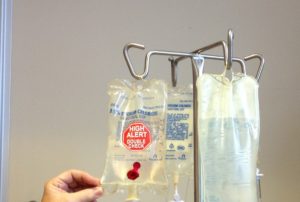Introduction
Lung cancer is a common chronic health condition worldwide. This life-long disease has accounted for approximately 1.8 million deaths since 2018. Moreover, it is commonly classified into two major subtypes: small-cell lung cancer (SCLC) and non-small-cell lung cancer (NSCLC). In particular, NSCLC accounts for approximately 85% of all lung cancer cases. You’re right where you need to be if you want to know the role of low-dose tyrosine kinase inhibitors in treating lung cancer.
Let’s dive into our discussion.
What is A Tyrosine Kinase Inhibitor
Tyrosine kinase inhibitors refer to pharmacologic agents that distort the signal transduction pathways of protein kinases by several types of inhibition.
The common side effects of first-generation tyrosine kinase inhibitors (TKIs), such as gefitinib and erlotinib, may include diarrhea, rash, acne, dry skin, nausea, vomiting, decreased appetite, fatigue, and mucositis. Other less common side effects may include liver function abnormalities, interstitial lung disease, and electrolyte imbalances. As with any medication, it’s crucial to discuss the potential risks and benefits with a healthcare provider and report any concerning symptoms promptly.
The common side effects of afatinib, which is a second-generation tyrosine kinase inhibitor (TKI), may include diarrhea, rash, nail changes, dry skin, decreased appetite, nausea, vomiting, fatigue, mucosal inflammation, and stomatitis. It’s important to note that some patients may experience more severe or less common side effects, so it’s essential to consult with a healthcare provider for personalized guidance and management.
The symptoms are usually manageable with supportive care or dose modification. Monitoring and managing these side effects are important to treating patients receiving TKIs.
What are EGFR Inhibitors?
A key driver of non-small-cell lung cancer is the epidermal growth factor receptor (EGFR). In addition, developing EGFR tyrosine kinase inhibitors (TKIs) has revolutionized the treatment of NSCLC patients harboring EGFR mutations. The (epidermal growth factor receptor (a transmembrane protein) frequently mutates in non-small cell lung cancer (NSCLC). The mutated EGFR gene leads to the production of a dysfunctional receptor that is hyperactivated, resulting in uncontrolled cancer cell growth and survival.
First Generation of Tyrosine Kinase Inhibitors (TKIs)
The development of EGFR tyrosine kinase inhibitors (TKIs) revolutionized the treatment of EGFR-mutant NSCLC. The first-generation TKIs, such as gefitinib and erlotinib, were developed in the early 2000s and showed significant efficacy in treating NSCLC patients with EGFR mutations.
However, acquired resistance to these drugs commonly occurred after a median progression-free survival of 9-13 months. The most common mechanism of acquired resistance was the development of a secondary T790M mutation in the EGFR gene.
Second Generation of Tyrosine Kinase Inhibitors (TKIs)
Second-generation TKIs such as afatinib was developed. These agents are irreversible EGFR inhibitors that covalently bind to the receptor, leading to more sustained inhibition than first-generation TKI lung cancer treatments. In addition, second-generation TKIs also have activity against the T790M mutation. Clinical trials have demonstrated that afatinib improves progression-free survival compared to gefitinib or erlotinib in the first-line setting for EGFR-mutant NSCLC.
Afatinib (GILOTRIF) is a second-generation, irreversible EGFR TKI that has shown efficacy in patients with EGFR-mutated NSCLC. The recommended dose for afatinib is 40 mg/day orally.
Third Generation of Tyrosine Kinase Inhibitors (TKIs)
More recently, third-generation TKIs such as osimertinib have been developed. These agents are highly selective for the T790M mutation and spare the wild-type EGFR. In clinical trials, osimertinib has shown significantly improved progression-free survival and overall survival compared to chemotherapy in patients with EGFR-mutant NSCLC who have acquired resistance to first-line EGFR TKI therapy.
While TKIs have significantly improved outcomes for EGFR-mutant NSCLC, they are associated with various side effects.
Clinical Trials
Low-Dose Afatinib Monotherapy
A prospective phase II trial of low-dose afatinib monotherapy for patients with EGFR-mutated NSCLC was recently conducted by the Thoracic Oncology Research Group. The study evaluates the safety and efficiency of a lower dose of afatinib (20 mg/day orally) in this patient population. The results of this trial may provide valuable information for optimizing afatinib dosing and improving outcomes for patients with EGFR-mutated NSCLC.
Dr. Noro published clinical research on low-dose afatinib for lung cancer in 2021. A prospective, phase II monotherapy trial with low-dose afatinib for patients with EGFR, mutation-positive, non-small cell lung cancer. The article describes a future phase II clinical trial assessing the efficacy and effectiveness of low-dose afatinib as a monotherapy for patients with EGFR mutation-positive non-small cell lung cancer.
The Thoracic Oncology Research Group conducted the study and involved 45 patients who received 20 mg of afatinib daily. The primary endpoint was progression-free survival, and the secondary terminus included overall survival, objective response rate, and safety. The results showed that the median progression-free survival was 9.3 months, and the accurate response rate was 66.7%.
The average overall survival rate was not reached during the analysis. The safety profile of the low-dose afatinib was acceptable, with the most common adverse events being diarrhea and skin rash. The study concluded that low-dose afatinib monotherapy was effective and well-tolerated in this patient population, suggesting a potential therapeutic option for patients with EGFR mutation-positive non-small cell lung cancer.
Low-Dose Osimertinib Monotherapy
Osimertinib is a third-generation EGFR tyrosine kinase inhibitor (TKI) with superior efficacy and better central nervous system penetration than first- and second-generation TKIs. However, its standard dose of 80 mg once daily is associated with significant adverse events, such as: diarrhea, rash, and interstitial lung disease.
In this study, Dr. Sonobe evaluated the efficacy and safety of a reduced dose of osimertinib (40 mg once daily) in patients with advanced NSCLC who had developed the T790M resistance mutation. Dr Sonobe enrolled 43 patients with T790M-positive advanced NSCLC who had progressed after previous EGFR TKI therapy. All patients received osimertinib at a dose of 40 mg once daily. The immediate termination was the objective response rate (ORR) by RECIST version 1.1.
After a median follow-up of 13.5 months, the ORR was 55.8%, including 6 complete and 18 partial responses. The disease control rate was 93.0%, and the median progression-free survival was 12.7 months. The overall survival was not reached at the time of analysis. The most common adverse events were diarrhea (55.8%), rash (46.5%), and paronychia (25.6%), all of which were mostly grade 1 or 2.
The low dose Osimertinib study suggests a reduced amount of osimertinib (40 mg once daily) may be effective and safe for patients with T790M-positive advanced NSCLC. The efficacy and safety outcomes were comparable to the standard dose (80 mg once daily) reported in previous studies. The lower amount of osimertinib may reduce the frequency and severity of adverse events, improving patients’ treatment adherence and quality of life.
Additional research is needed to confirm our findings and establish the optimal dose of osimertinib for this patient population.
Using a reduced dose of TKI, such as osimertinib, for treating advanced non-small-cell lung cancer in patients with T790M mutation has shown promising results. The lower amount may help reduce the incidence and severity of adverse effects while maintaining efficacy, improving patients’ quality of life and overall outcomes.
However, further studies with larger patient populations and longer follow-up periods are needed to validate the effectiveness and safety of reduced-dose TKI in lung cancer treatment.
NOTE: The decision to use a lower dose of TKI should be made individually, considering the patient’s characteristics, disease stage, and other relevant factors. Nonetheless, using lower doses of TKI represents a potentially valuable treatment option for advanced NSCLC patients, particularly those with T790M mutation-positive disease.
Conclusion
Low-dose tyrosine kinase inhibitors show great potential in treating lung cancer. Regular treatment adds more years and increases the quality of life. Regain control of your life over cancer. To learn more, call Dr. Paul Zhang, MD, at Omega Precision Oncology, a center for evidence-based cancer treatment. Dial 7137971900.



